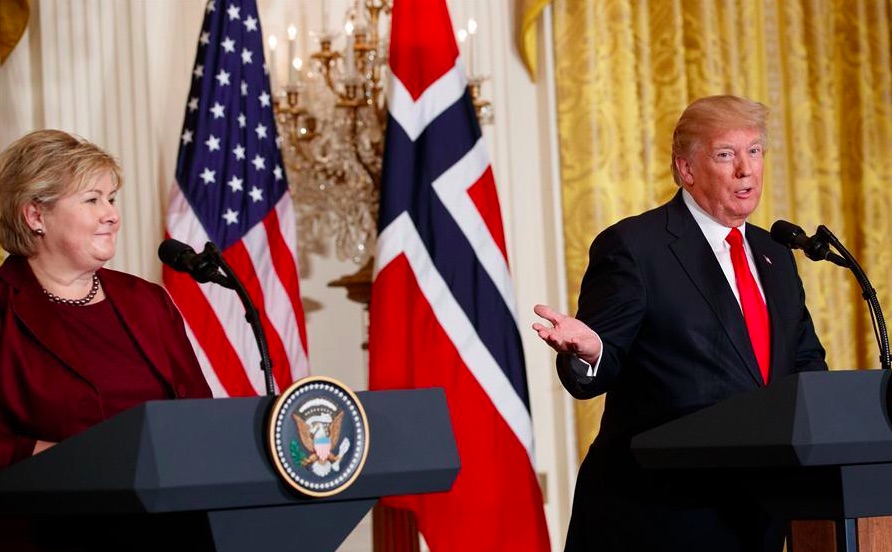
By Atâyi Babs
President Donald Trump on Wednesday declared his love for the environment stating that the only problem he has with the Paris Agreement is the fact that the agreement negotiated by the Obama administration treated the U.S. unfairly.
He admitted that Washington could rejoin the climate accord under fairer terms.
In a press briefing held with Norwegian Prime Minister Erna Solberg, President Donald Trump said that negotiators “as usual, made a bad deal” but U.S. could “conceivably” re-enter into global climate change mitigation efforts under the Paris accord.
Withdrawing from the Paris Deal
In June, the US president announced that he would be withdrawing his country from the landmark deal, leading to accusations of surrendering Washington’s leadership role on climate action, which his predecessor, Barack Obama, championed.
While the NDC legally remains in place until 2019, the Trump administration has already stopped implementation, and on June 1, 2017, announced that the U.S. would pull out of the Paris agreement unless it could identify suitable terms for re-engagement.
During the briefing, Trump suggested that America’s target set in the NDC by 2025 put it at a disadvantage and would force businesses to close.
Launching into an unclear comparison, he said “China, by 2030—they don’t kick in until 2030,” he said as an example. “Russia, some place in the mid-1990s, that was their standard, and that was never a good standard because that was a dirty standard for the environment.”
He also stressed that his administration is “very strong” on the environment. “I feel very strongly about the environment.”
He added that the Environmental Protection Agency (EPA) and its “commissioners”—the EPA is headed by an administrator who has backed withdrawal from the global agreement owing to its impact on jobs—“are very very powerful in the sense that they want to have clean water, clean air—but we also want businesses that can compete. And the Paris accord really would have taken away our competitive edge. And we’re not going to let that happen. I’m not going to let that happen,” Trump said.
The Norwegian Example
Extolling the Paris accord, Norwegian Prime Minister Solberg at the briefing in White House added that “there are business opportunities” posed by the Paris accord.
Norway’s strict regulations to reach its Paris targets of reducing greenhouse gas emissions by 40% below 1990 by 2030 has spurred the use of “environmental friendly and climate friendly technologies.” She added that these efforts have played a small part in Norway’s tremendous surplus. “You never miss up on a good opportunity with good environmental standards,” she said.
Norway’s power sector is almost carbon neutral, with hydropower covering roughly 95% of domestic power generation, even though it is home to the biggest hydrocarbon reserves in Europe and the fifth-largest exporter of crude oil in the world. The oil and gas sector constitutes about 22% of Norwegian gross domestic product.
Trump lauded Norway’s hydropower prowess. “One of the great assets of Norway is a thing called water, and they have tremendous hydropower, tremendous. In fact, most of your energy—your electricity—is produced by hydro,” he told Solberg.
“I wish we’d do some of that,” he remarked—possibly uninformed that the U.S., too, harbors sizable hydropower resources, which produced 267.8 TWh, or about 7% of the nation’s total generation, in 2016. In fact, U.S. hydropower generation was nearly double that of Norway, which produced 143.4 TWh of hydropower in 2016.
Sign for a renegotiation of the Paris deal?
Could this latest volte-face by Trump be indicative of subtle attempts to renegotiate the Paris deal?
On the 1st of June 2017, Trump while announcing the withdrawal of the US from the Paris accord added that “ we will begin negotiations to reenter the Paris accord or an entirely new transaction on terms that are fair to the United States.”
Almost seven months after, these negotiations are yet to happen.
However, some are quick to point to the fact that US government sent a delegation to the recently concluded 23rd session of the United Nations Framework Convention on Climate Change (UNFCCC COP23) which held November 2017 in Bonn Germany as a sign that possible renegotiation was already underway.
Sensing a possible tinkering with the Paris Agreement, African civil society groups at the Bonn climate talks called on parties (countries) to the UNFCCC to kick out the delegation from United States and their allies from the climate negotiations.
The non-state actors under the umbrella of the Pan African Climate Justice Alliance (PACJA) questioned the rationale and the morality behind the continuous participation of the US delegation in negotiating the ‘operating system’ of a climate accord in which the country defiantly walked away from.
They urged the COP leadership under the presidency of Fiji to “lead the US delegation to the door and show them the way out.”
“The actions of President Donald Trump do not reflect good faith and the spirit of cooperation in international climate change dialogue processes,” Mithika Mwenda, PACJA’s Secretary General said.
Though the COP leadership never heeded their call, the validity of their position was further confirmed when the US delegation to the COP23 openly promoted fossil fuels and nuclear power as solutions to climate change at the conference.
White house officials actively participated in a COP23 event that highlighted the role of coal and other fuels in curbing the impacts of rising temperatures, thus fueling speculations that a renegotiation of the climate deal was underway.
On his own part, President of France, Emmanuel Macron in September 2017 affirmed that the landmark Paris climate deal will not be renegotiated.
The French President disclosed this during his address to the UN General Assembly amidst renewed hopes that the world’s second largest polluter would remain tied to the accord’s carbon emission targets. Macron also told his audience that “the door will be open” for the United States to return to the agreement if it so wishes.
“This agreement will not be renegotiated.” “We will not retreat” he added.
Macron later reiterated his position in an interview at the December 2017 One Planet Summit that it would be impossible for Trump to “renegotiate with 180 or 190 countries,” and that he had organized the summit in order “to show that we can deliver even without the U.S. federal government.”
A Paris Agreement without the United States
How workable is a Paris Agreement without the support of the US Federal government?
US is arguably the world’s largest emitter of green house gases as well as a key source of climate finance. How well can the world manage these contrasting realities in a post-Paris deal era that leaves out the United States?
Experts have argued that in addition to popular challenges of inadequate flow of finance for adaptation and mitigation measures, absence of capacity building and technology transfer, the withdrawal of the US from the Paris Agreement has become a major challenge as it implies that the U.S. will refuse to make any additional contributions to the UN Green Climate Fund.
The fact that the world’s largest economy and the largest per capita emitter will decline to take on policies to curb greenhouse gas emissions and simultaneously refuse to contribute to a fund largely devoted to adaptation measures in the world’s poor countries is dangerous and unprecedented.
The desires in the developing world to improve quality of life in a sustainable way will not go away. Programs such as the U.N. Sustainable Development Goals are evidence of a deep commitment to those improvements. But with the U.S. decision to abandon the Paris accord, delivering on those commitments just might get significantly more difficult.
It is also believed that Trump’s decision could deepen a shortfall in public funding for the Paris Agreement, by halting billions of dollars that had been earmarked for climate change.
A study by the Organization of Economic Cooperation and Development (OECD) predicts rich governments will invest about $67 billion in climate change by 2020—only two-thirds of what they promised under the Paris Agreement.
The study further reveals that public financing is more predictable than private-sector money. “Mobilised private finance in 2020 cannot be projected with the same degree of confidence as public finance,” says the OECD.
The above makes the situation even more scary for climate enthusiasts but whether these considerations are enough to justify a renegotiation of the Paris climate deal remains to be seen.











